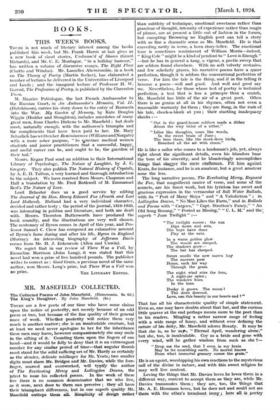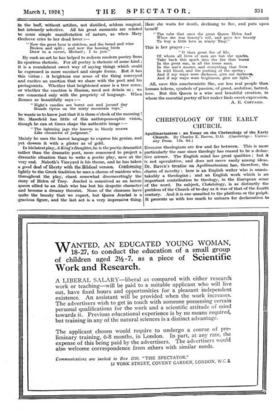MR. MASEFIELD COLLECTED.
THERE are a few poets of our time who have some claims upon the notice of posterity, not merely because of an odd poem or two, but because of the fine quality of their general mass of work. Whether posterity will notice them very much is another matter; she is an incalculable creature, but at least we need never apologize to her for the inheritance these men may leave, however compassionately she may smile in the sifting of it. ' Counting them upon the fingers of one hand—and it would be folly to deny that it is an extravagant number for any similar period Of time—that angular thumb must stand for the solid sufficing art of Mr. Hardy as certainly as the slender, delicate midfinger for Mr. Yeats; two smaller digits must share Mr. Bridges and Mr. Davies, while the fore- finger, scarred and overworked, will typify the author of The Everlasting Mercy and Lollingdon Downs, the latest to issue his collected poems. In the work of these five there is no common denominator that we who live, as it were, next door to them -fan perceive ; they all have their triumphant differences, but in one superb quality Mr. Masefield outtops them all. Simplicity of design rather
than subtlety of technique, emotional sweetness rather than grandeur of thought, intensity of experience rather than magic of phrase, are at present a little out of fashion in the forum, but excepting Browning no English poet can tell a story with so fine a dramatic sense as Mr. Masefield. He is that exceeding rarity in verse, a born story-teller. The emotional tone is sometimes reminiscent of William Morris—indeed, " King Cole " might be a kind of pendant to " Love is Enough " —but he has in general a tang, a vigour, a poetic sweep that are seldom found elsewhere. With no soft velvety ecstasies, and few scholarly graces, his narrative poems have a queer perfection, though it is seldom the conventional perfection of verse. For him the tale is the thing, and if in the telling it become a poem—well and good. And well and good say we. Nevertheless, for those whose test of poetry is technical perfection, a test that is less a principle than a crutch, Mr. Masefield has little of the air of a great poet. Often there is no genius at all in his rhymes, often not even a reasonable warranty for them ; they are flung, in the rush of his tale, chock-a-block at you ; their startling inadequacy
shocks :-
" out in the guard-house soldiers made a dither About the wiry titter of a zither."
" Lilies like thoughts, roses like words, In the sweet brain of June ; The bees there, like the stock-dove birds, Breathed all the air with croon."
He is like a sailor who comes to a landsman's job, yet, always right about the significant details, even his blunders bear the tone of his sincerity, and he blunderingly accomplishes
things that stagger the mere craftsman. Pit him against
Keats, for instance, and he is an amateur, but a great amateur none the less.
The long narrative poems, The Everlasting Mercy, Reynard the Fox, that magnificent canter of verse, and some of the sonnets, are his finest work, but his lyricism has sweet and gracious expression in the vernacular of Salt Water Ballads, with its " Port of Many Ships " and " A Valediction " ; in Lollingdon Downs, " No Man Likes the Farm," and in Ballads and Poems with " Cargoes," " Capt. Stratton's Fancy," " An Old Song Resung," " Posted as Missing," " C. L. M." and the; superb " June Twilight "
The twilight comes ; the sun Dips down and seta, The boys have done Play at the nets.
In a warm golden glow
The woods are steeped. The shadows grow—
The bat has cheeped.
Sweet smells the new mown hay The mowers pass Home, each his way Through the grass.
The night wind stirs the fern, A night-jar spins ; The windows burn In the inns.
Dusky it grows. The moon I The dews descend.
Love, can this beauty in our hearts and "
That has all his characteristic quality of simple statement. Even so, one may have doubts about that bat, and the curious little quaver at the end perhaps means more to the poet than to his readers. Mingling a rather narrow range of feeling with a wide range of fancy, and without ever defining the nature of his deity, Mr. Masefield adores Beauty. It may be
that she is, as he saga, " Eternal April, wandering alone," but she, too, is incalculable. Coy as a bride and gone with every wind, will he gather wisdom from such as she ?—
" Drop me the seed, that I even in my brain May be its nourishing earth. No mortal knows From what immortal granary comes the grain."
He is an egoist, worshipping his own reactions to the mysterious call of the divine in nature, and with this sweet religion he may well live content.
Loving the things that Mr. Davies loves he loves them in a different way, content to -accept them as they are, while Mr. Davies transmutes them ; they are, too, the 'things that Mr. A. E. Housman loves, but he does not and could not see
them with the other's trenchant irony.; here all is poetry
in the buff, without artifice, not distilled, seldom, magical, but intensely selective. All his great moments are related
to some simple manifestation of nature, as when Mary 'Oecleeve cries to her dead lover :—
" Now the great hour is staicken, and the bread and wine Broken and spilt ; and now the homing birds Draw to a covert, Michael ; I to you."
By such an art he has helped to redeem modern poetry from its spurious rhetoric. For all poetry is rhetoric of some kind ; it is a roundabout sweet way of saving things which could be expressed in more succinct and simple forms. But it has this virtue : it heightens our sense of the thing conveyed
and excites an emotion that we share with the poet and his protagonists. Whether that heightened sense is a true sense, or whether the emotion is illusion, need not detain us ; we are concerned only with the propriety of language. When Romeo so beautifully says :- " Night's candles are burnt out and jocund day Stands tiptoe on the misty mountain tops," he wants us to know just that it is three o'clock of the morning ! Mr. Masefield has little of this anthropomorphic vision, though he can at times shape the authentic image :— " The lightning jags the heaven in bloody scrawa Like chronicles of judgment."
Mainly he uses the barest language to express his genius, and yet dowers it with a glister as of gold.
In his latest play, A King's Daughter, he is the poetic dramatist rather than the dramatic poet, more concerned to project a dramatic situation than to write a poetic play, save at the very end. Naboth's Vineyard is his theme, and he has taken a good deal of liberty with the Biblical version. Conforming lightly to the. Greek tradition he uses a chorus of maidens who,
throughout the play, chant somewhat disconcertingly the story of Helen of Troy. Jezebel is conceived as an heroic queen allied to an Ahab. who has lost his despotic character and become a dreamy theorist. None of the choruses have quite the beauty that we expect, but Queen Jezebel is a !gracious figure, and the last act is a very impressive thing. Here she waits for death, declining to flee, and puts upon herself
" The robe that once the great Queen Helen had When she was beauty's self, and gave her beauty To buy a little love in windy Troy."
This is her prayer :-
" 0 thou great fire of life, Of whom all lives of men are but the sparks, Take back this spark into the fire that burns In the great sun, in all the lesser suns,
In the sun's moons, and everything that lives In wild blood, and the pushing of the spring ; And if my ways were darkness, give me darkness, And if my ways were brightness, give me light."
All, save this anachronistic She, are less real people than human tokens, symbols of passion, of greed, ambition, hatred, love. But this Queen is a wise and beautiful creation, in whom the essential poetry of her maker finds sweet expression.
A. E. COPPARD.











































 Previous page
Previous page